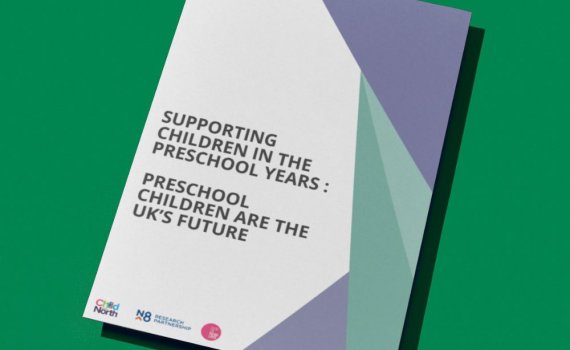
New data from Child of the North shows stark inequalities in the number of children who have the skills needed to thrive in school, but also highlights solutions to address these inequalities.
According to new analysis by Child of the North, the data also shows:
- There is a 9.6% gap in school readiness between advantaged and disadvantaged regions, with children in Northern regions remaining disproportionately disadvantaged (Inner London: 64.9%; North West: 55.3%).
- These disparities are even starker within local areas, with the school readiness rate in Bradford ranging from 52% in the most deprived areas to 86% in more advantaged areas.
- Teacher surveys reveal 49% believe the issue is worsening, with growing concerns over toilet training, social interactions, and screen time among preschool children.
- Economic modelling demonstrates that early life disadvantage causes problems to multiply and cascade across a child’s life course, creating long-term health burdens and hampering economic growth.
The latest update, titled ‘Supporting children in the preschool years: A new approach to improving the UK’s health‘ is the 9th to be released as part of the Child of the North’s #ChildrenFirst campaign.

“Our work in Bradford has shown that averages hide stark inequalities in children’s health and development, and that children living in disadvantage need additional support to address the complex challenges that they face. What we’ve learned is that by connecting data across health, education, and social care services, we can identify which children need support and what type of support will be most effective. This connected approach is not just theoretical – it’s working on the ground in Bradford, and could help other areas across England to close the school readiness gap.”
Professor Josie Dickerson, Director of Early years, Prevention and Child Equity at Born in Bradford
The report is a collaboration of partnership work across the city including the Prevention & Early Help Systems Board, the Children and Young People’s Act as One programme, Bradford’s Health Determinants Research Collaborative, and draws on data from Connected Bradford, supported by the National Institute for Health and Care Research Applied Research Collaboration (NIHR ARC) Yorkshire and Humber. Born in Bradford is one of the largest birth cohort studies in the UK, tracking the health and development of over 30,000 Bradford children and their families, providing crucial insights into what works to improve outcomes for children in disadvantaged communities.
The Bradford model that can be scaled up nationwide consists of three key components: a co-produced outcomes framework that integrates data from all services working with children from birth to adulthood, revealing hidden inequalities at neighbourhood level; predictive modelling using Connected Bradford’s linked data to identify which children are at risk of poor outcomes and what specific support they need; and shared accountability partnerships bringing together health, education, local authority, police and voluntary sector leaders to align efforts around improving outcomes equitably. This integrated approach enables more appropriate targeting of services and ensures the right support reaches the right children at the right time. The Child of the North’s #ChildrenFirst campaign was launched at the National Opportunity Summit hosted in Leeds on Monday 8 September, where Minister Josh MacAlister pledged his support towards building a country that works for all children on his first day as Parliamentary Under-Secretary in the Department for Education.
#ChildrenFirst builds on a major series of reports produced last year on key topics identified by Northern child health leaders as major issues of concern, including poverty, special educational needs, school attendance and mental health. The reports included evidence-based plans and recommendations for policymakers to help address these issues.
The #ChildrenFirst campaign also includes the launch of toolkits designed to help schools, child health workers and local authorities take practical steps to improve the health and wellbeing issues faced by the children and young people in their care.
The toolkits are published on a weekly basis over a 12 week period from September to December 2025, alongside the re-released reports in the ‘A country that works for all children and young people’ series, which were produced jointly by Child of the North – a collaboration between the N8 Research Partnership and Health Equity North – and the Centre for Young Lives think tank.
The toolkits provide evidence and suggestions about how all parties can work together to build a country that works for all children and young people. The goal is to ensure alignment between practitioners on the ground and government’s work on the Opportunity Mission to make certain that every child has the best possible start in life.
“The evidence is unequivocal – the first years of life are critical to a child’s lifelong health, educational attainment, and life opportunities. We must maintain a relentless focus on prevention and that means from birth onwards. Bradford has shown us what works – now we need to scale up this approach across the UK to ensure no child is left behind.”
Baroness Anne Longfield, Founder of the Centre for Young Lives
Each of the 12 reports is based on in-depth research carried out by academic experts in children and young people’s health and wellbeing from universities across the North of England and beyond, including N8 Research Partnership members Leeds, Manchester, Durham, York, Lancaster, Liverpool, Sheffield and Newcastle, the University of Bradford, and others.
The policy recommendations made in the reports have helped to shape the Government’s Opportunity Mission – the goal of which is to break down the link between a person’s background and their future success, and giving children the best start in life.
“This update shows that a third of children are arriving at school without the core skills needed to achieve and thrive. We need a system-wide solution that addresses the multiple social determinants of unequal child development. Bradford’s pioneering Early Years Systems Approach offers a model that other local authorities can adopt to achieve the 75% school readiness target and reduce child inequities within a generation.”
Professor Mark Mon-Williams, Report Series Editor